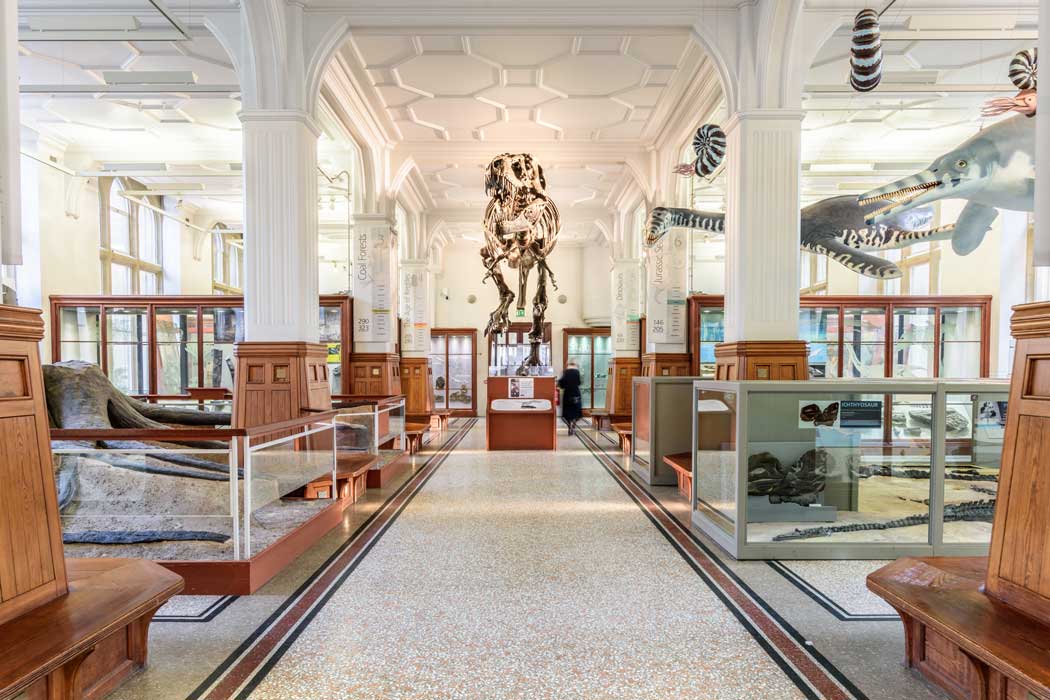The Manchester Museum has archaeology and natural history displays and is best known for its excellent Egyptology exhibits. It is the largest university museum in the United Kingdom.

What to see at the Manchester Museum
The museum’s varied collection is spread over four floors and is organised into a number of galleries that focus on specific aspects of the museum’s collection.
Ancient Worlds galleries
The three Ancient Worlds galleries occupy some of the main gallery space and include the Discovering Archaeology gallery that has displays showing how archaeology helps us understand the past and also has exhibits about prominent archaeologists including William Flinders Petrie and William Boyd Dawkins and their role in the development of the museum.
The Egyptian Worlds gallery has exhibits from Ancient Egypt and Sudan that date back 5,000 years. Highlights of this gallery include two mummies from the Roman period and the mummy and coffin of a woman known as Asru, who lived around 2700 years ago in Thebes.
There are displays where you can learn about ancient Egyptian beliefs as well as exhibits depicting everyday life in ancient Egypt.
In 2013 it was discovered that the gallery’s 25 cm (10 in) statue of Neb Sanu was rotating in a perfect circle while other statues in the same display case remained stationary. Manchester University’s Professor Brian Cox suggests differential friction between the glass shelf and the object was causing the movement, but the museum’s Egyptologist Campbell Price suggested that it may be an Egyptian curse.
The Exploring Objects gallery has exhibits showing why people take an interest in collecting, sorting and labelling things. This gallery provides an insight into what motivates archaeologists and museum curators as well as modern techniques for exploring objects including 3D scanning.
Fossils, Minerals and Meteorites
The museum has three rooms devoted to fossils, minerals and meteorites. Highlights of this gallery include an enormous fossil tree, a Plesiosaur and Stan, a reproduction cast of a Tyrannosaurus rex excavated in South Dakota in 1992 that was acquired by the museum in 2004.
Living Cultures
The Living Cultures collection includes around 18,000 items from around the world, which tell us about far-flung cultures from Peru to Oceania and Southeast Asia.
Living Worlds
The Living Worlds gallery is a modern take on a natural history gallery with exhibits that explore attitudes to nature and environmental issues. This gallery features a crane atop a piece of rubble from the Hiroshima atomic bomb blast, a sheep wearing a woolly jumper and the skull of Old Billy, the world’s oldest horse.
There is a web app that you can use to get more information about the exhibits as you explore this gallery.
Manchester gallery
The Manchester gallery highlights the links between the museum’s collections and the city’s history and culture. The gallery’s exhibits include two animals from Manchester’s Belle Vue Zoo: Maude, the zoo’s tigon and Maharajah, the circus elephant who walked from Edinburgh to Manchester in 1872. The Belle Vue Zoological Gardens operated from 1836 to 1977 and at one point was the third-largest zoo in the United Kingdom.
Money gallery
The Money gallery depicts the history of money starting with coins used by the ancient Greeks and Romans and includes money from China, India and the Islamic world, culminating in the modern credit card.
Nature’s Library
The Nature’s Library gallery displays the museum’s natural history collection and includes rare and extinct animals including birds and butterflies.
Vivarium
The Vivarium is responsible for an important captive breeding programme for critically endangered species including the Lemur Leaf Frog from Costa Rica.
Visiting the Manchester Museum
The Manchester Museum is on the grounds of the University of Manchester on Oxford Road south of the city centre. It is around a 20-minute walk into the city centre although buses to central Manchester run frequently from the bus stop just north of the museum.
Entry to the museum is free and includes organised tours that give you a more in-depth look at specific parts of the museum’s collection. These tours include the visitor team tours that run from the reception desk at 2pm Tue–Thu and Vivarium tours that operate at noon on Thursdays.
Visitor facilities include a cafe and gift shop.
You should budget on spending around 2–3 hours exploring the museum.
Nearby attractions include The Whitworth, which is a 10-minute walk south of the museum.


There are no comments yet.